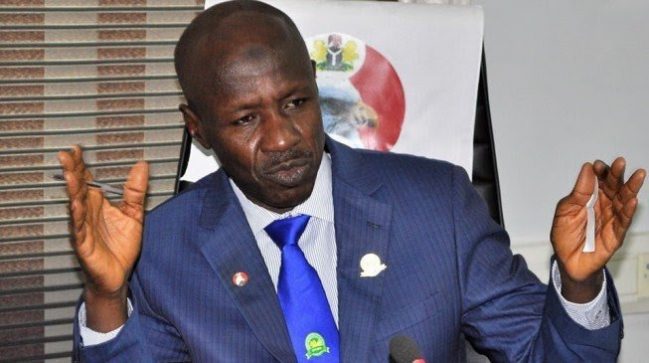

A lawyer, Johnmary Jideobi, has urged the Abuja Division of the Court of Appeal to declare the continued stay in office of the Acting Chairman of the Economic and Financial Crimes Commission (EFCC), Ibrahim Magu as illegal and unconstitutional.
Jideobi is challenging the judgement of the Federal High Court in Abuja which held that nothing in the law circumscribed President Muhammadu Buhari’s powers to retain Magu in office, or provided a timeframe within which he could serve as acting Chairman of the anti-graft agency.
It will be recalled that Justice Ijeoma Ojukwu had in the judgement she delivered on December 4, 2019, declined to invalidate Magu’s continued stay in office.
Justice Ojukwu, however, stressed that it was a mandatory requirement of the law that President Buhari’s nomination of Magu as substantive head of the anti-graft agency must be subject to confirmation and validation by the Senate.
She held that EFCC is not an extra-Ministerial department of the Federal Government and as such, the law provided that anyone nominated as its Chairman by the President must pass through necessary “checks and balances” by the Senate.
“Public interest is very paramount in the appointment of any person to head to the EFCC,” Justice Ojukwu held.
She further held that there was a lacuna in the law since section 2(3) of the EFCC Act did not put a limitation to President Buhari’s powers to retain Magu in an acting capacity.
“The lacuna has given the President the proverbial knife and the yam to do as he pleases,” she stated.
The judge also stated that there was the need for a renewed consciousness that laws must be implemented in accordance with the public interest and not exploited to install Magu in substantive capacity.
The judgments followed five separate suits that bordered on the legality or otherwise of Magu’s continued stay in office as Acting Chairman of the EFCC, despite twice rejection of his nomination by the Senate under the 8th National Assembly.
While two of the suits which were in Magu’s favour, contended that President Buhari ought not to have transmitted his nomination to the Senate for confirmation, three other plaintiffs prayed the court to declare that his tenure as acting head of the anti-graft agency expired the moment the Senate rejected his nomination for the second time.
Read Also: Court Dismisses Suit Seeking Magu’s Sack As EFCC Chair
The pro-Magu litigants argued that transmission of Magu’s nomination to the Senate for screening was in breach of section 171 of the Constitution, insisting that EFCC is an extra-ministerial department of the federal government.
However, the anti-Magu litigants who are equally lawyers maintained that he was not a fit and proper person to head the agency since he was twice rejected by the Senate based on an adverse security report from the Department of State Service, DSS.
They separately urged the court to among other things, declare that by combined provisions of section 2(3) of the EFCC Act, 2004 and section 11 of the Interpretation Act, Magu could not continue to parade or hold out himself as Acting Chairman of the EFCC, his nomination having been twice rejected by the Senate.
Besides, they sought for an order to restrain President Buhari from re-nominating him, as well as an order stopping Senate from accepting or acting on such re-nomination when made.
They argued that the moment his nomination was rejected for the second time by the Senate, he could no longer be re-appointed in any capacity at the agency.
Meanwhile, in his appeal, Jideobi argued that the trial Judge erred in law “when after affirming the mandatoriness or obligatory connotation of the word ‘shall’ as used in Section 11 (1) (c) of the Interpretation Act in relation to the tenure of the 4th Respondent, then did a summersault to dismiss the Appellant’s claims.”
The appellant maintained that Magu, “has exhausted more than four years in the position of ‘Acting Chairman’ of the Economic and Financial Crimes Commission without the mandatory confirmation of the Senate.
“By refusing to sack the 4th Respondent after making correct finds, the Learned trial Judge wrongly applied the law and unwittingly gave a judicial imprimatur to a constitutional violation in appointments strictly governed by statutes.
“By not giving effect to mandatory provisions of the Constitution, the Interpretation Act, and the Economic and Financial Crimes Commission Act, the learned trial Judge has allowed those laws to fall into disuse.”
In his second ground of appeal, the lawyer argued that the trial judge erred in law by refusing to uphold the contention that Magu’s tenure as the ‘Acting Chairman’ of the EFCC “has ended by operation of law when the President of the Federal Republic of Nigeria sent his name.
He therefore urged the appellate court to set aside the high court judgement as “perverse”, saying it “occasioned a miscarriage of justice.”





















